Business Law in the Global Context: Economic Power Shift Analysis
VerifiedAdded on 2021/10/11
|12
|2711
|63
Report
AI Summary
This report delves into the significant shift in global economic power from developed to developing nations, highlighting the rise of countries like China and India. It analyzes the implications of this shift, including the increasing purchasing power of developing countries, investment opportunities, and the role of the G-20. The report explores the challenges faced in integrating international business due to these changing dynamics, such as shifts in consumer markets and the need for reform within the WTO. It examines the impact of this power shift on various aspects of international business, including foreign direct investment, trade patterns, and the need for adjustments in global governance structures. The report concludes by emphasizing the need for recognizing the growing influence of developing nations in the global economic framework and adapting existing systems to reflect these changes, particularly within institutions like the WTO.
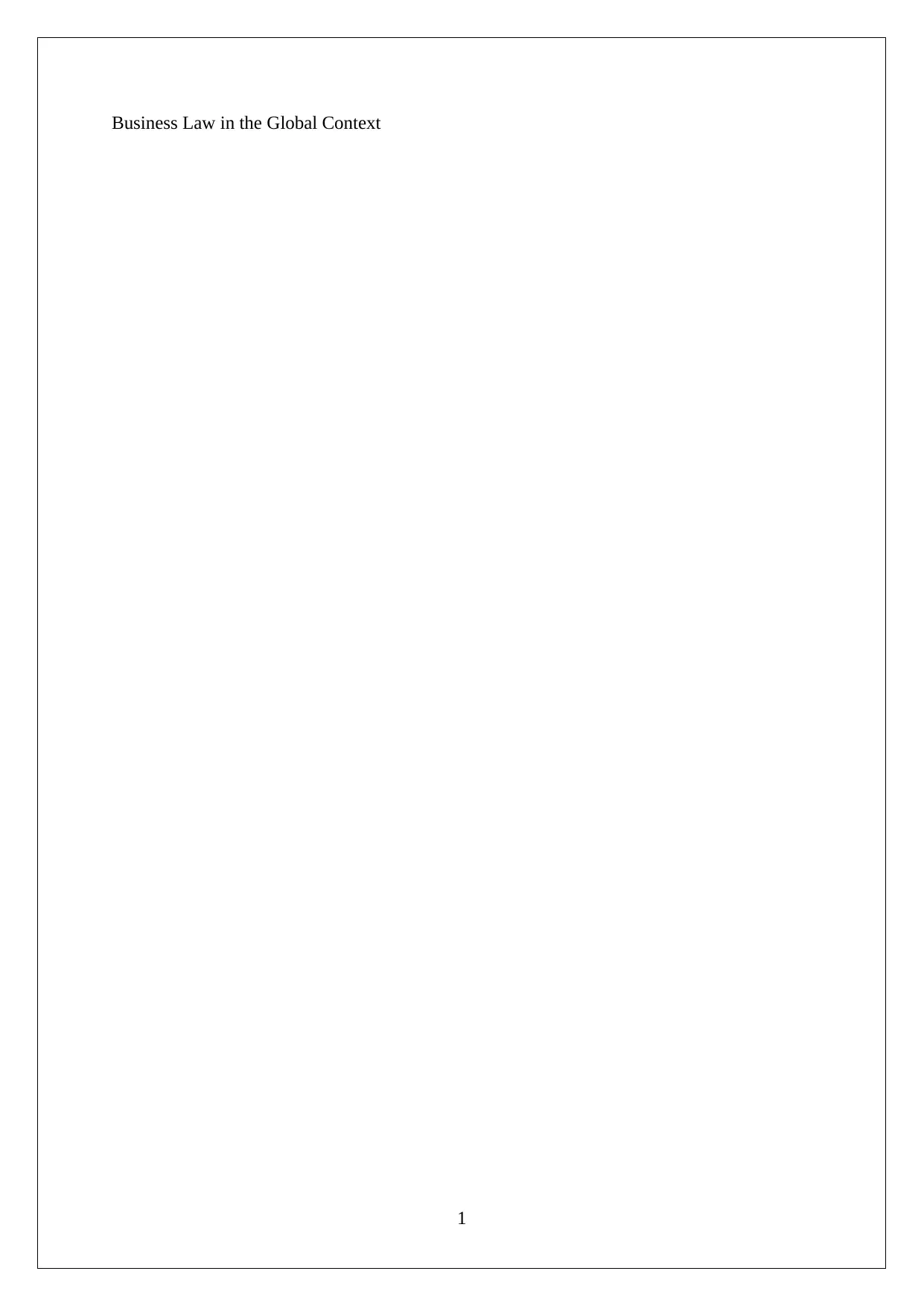
Business Law in the Global Context
1
1
Paraphrase This Document
Need a fresh take? Get an instant paraphrase of this document with our AI Paraphraser
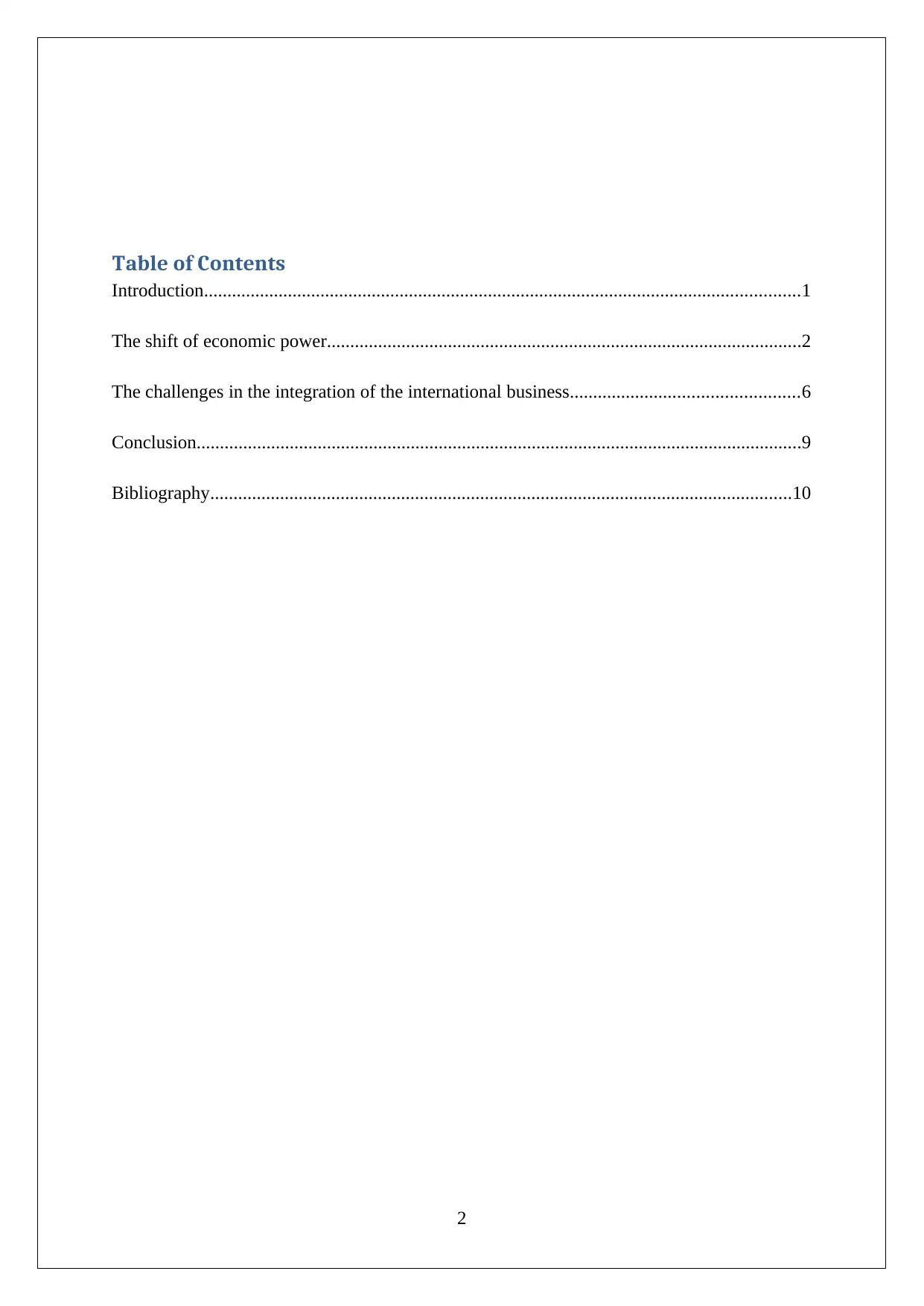
Table of Contents
Introduction................................................................................................................................1
The shift of economic power......................................................................................................2
The challenges in the integration of the international business.................................................6
Conclusion..................................................................................................................................9
Bibliography.............................................................................................................................10
2
Introduction................................................................................................................................1
The shift of economic power......................................................................................................2
The challenges in the integration of the international business.................................................6
Conclusion..................................................................................................................................9
Bibliography.............................................................................................................................10
2
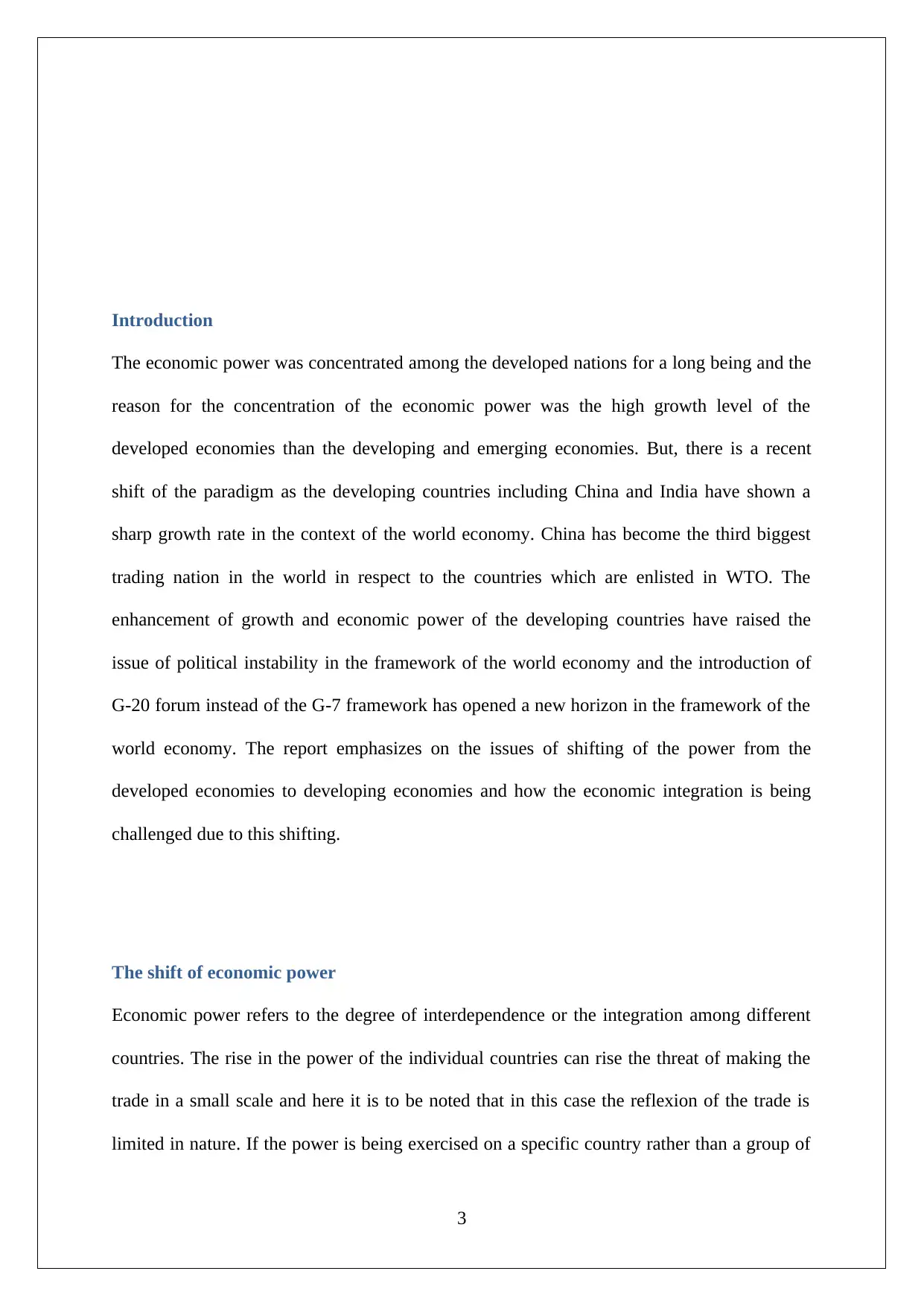
Introduction
The economic power was concentrated among the developed nations for a long being and the
reason for the concentration of the economic power was the high growth level of the
developed economies than the developing and emerging economies. But, there is a recent
shift of the paradigm as the developing countries including China and India have shown a
sharp growth rate in the context of the world economy. China has become the third biggest
trading nation in the world in respect to the countries which are enlisted in WTO. The
enhancement of growth and economic power of the developing countries have raised the
issue of political instability in the framework of the world economy and the introduction of
G-20 forum instead of the G-7 framework has opened a new horizon in the framework of the
world economy. The report emphasizes on the issues of shifting of the power from the
developed economies to developing economies and how the economic integration is being
challenged due to this shifting.
The shift of economic power
Economic power refers to the degree of interdependence or the integration among different
countries. The rise in the power of the individual countries can rise the threat of making the
trade in a small scale and here it is to be noted that in this case the reflexion of the trade is
limited in nature. If the power is being exercised on a specific country rather than a group of
3
The economic power was concentrated among the developed nations for a long being and the
reason for the concentration of the economic power was the high growth level of the
developed economies than the developing and emerging economies. But, there is a recent
shift of the paradigm as the developing countries including China and India have shown a
sharp growth rate in the context of the world economy. China has become the third biggest
trading nation in the world in respect to the countries which are enlisted in WTO. The
enhancement of growth and economic power of the developing countries have raised the
issue of political instability in the framework of the world economy and the introduction of
G-20 forum instead of the G-7 framework has opened a new horizon in the framework of the
world economy. The report emphasizes on the issues of shifting of the power from the
developed economies to developing economies and how the economic integration is being
challenged due to this shifting.
The shift of economic power
Economic power refers to the degree of interdependence or the integration among different
countries. The rise in the power of the individual countries can rise the threat of making the
trade in a small scale and here it is to be noted that in this case the reflexion of the trade is
limited in nature. If the power is being exercised on a specific country rather than a group of
3
⊘ This is a preview!⊘
Do you want full access?
Subscribe today to unlock all pages.

Trusted by 1+ million students worldwide
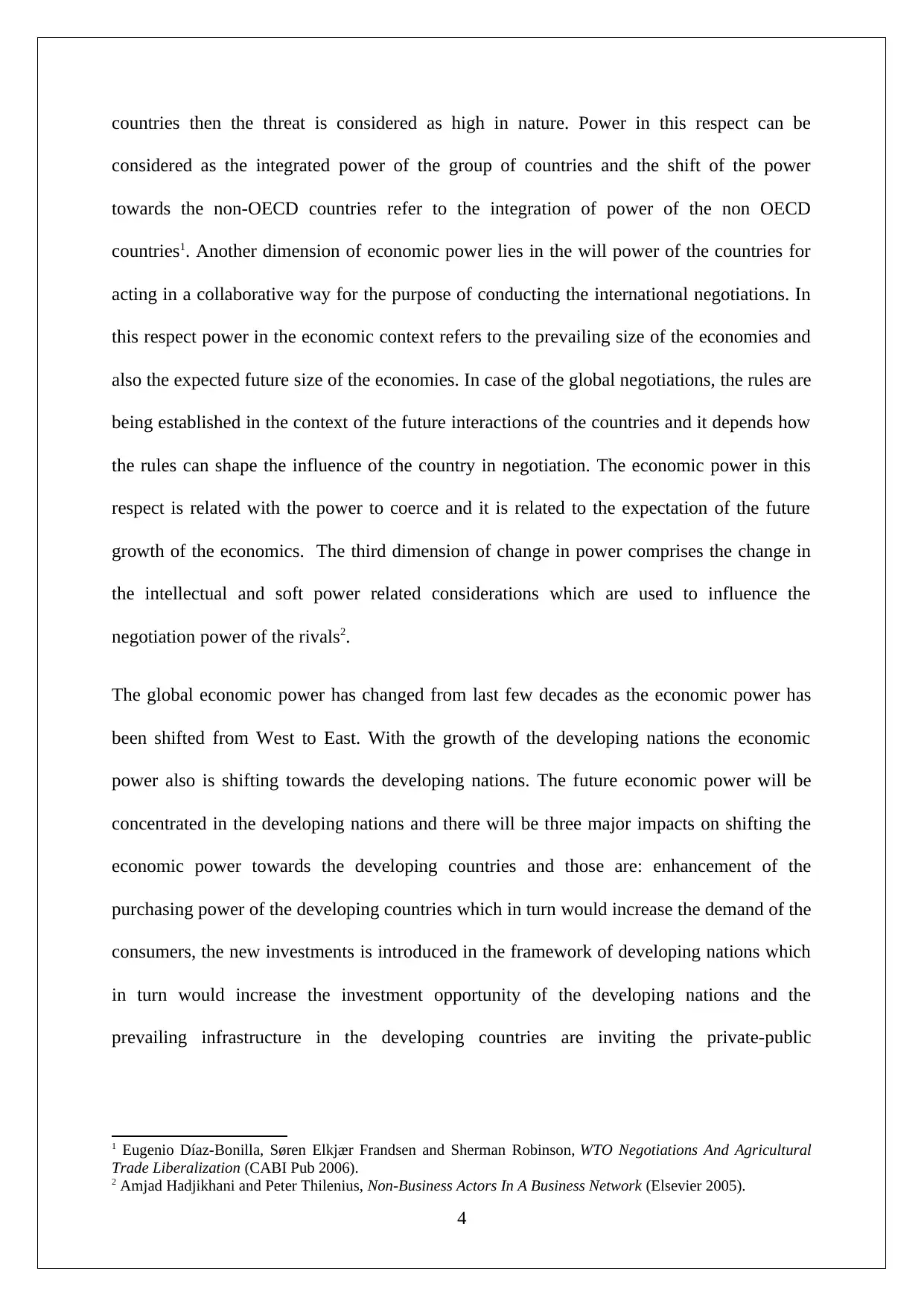
countries then the threat is considered as high in nature. Power in this respect can be
considered as the integrated power of the group of countries and the shift of the power
towards the non-OECD countries refer to the integration of power of the non OECD
countries1. Another dimension of economic power lies in the will power of the countries for
acting in a collaborative way for the purpose of conducting the international negotiations. In
this respect power in the economic context refers to the prevailing size of the economies and
also the expected future size of the economies. In case of the global negotiations, the rules are
being established in the context of the future interactions of the countries and it depends how
the rules can shape the influence of the country in negotiation. The economic power in this
respect is related with the power to coerce and it is related to the expectation of the future
growth of the economics. The third dimension of change in power comprises the change in
the intellectual and soft power related considerations which are used to influence the
negotiation power of the rivals2.
The global economic power has changed from last few decades as the economic power has
been shifted from West to East. With the growth of the developing nations the economic
power also is shifting towards the developing nations. The future economic power will be
concentrated in the developing nations and there will be three major impacts on shifting the
economic power towards the developing countries and those are: enhancement of the
purchasing power of the developing countries which in turn would increase the demand of the
consumers, the new investments is introduced in the framework of developing nations which
in turn would increase the investment opportunity of the developing nations and the
prevailing infrastructure in the developing countries are inviting the private-public
1 Eugenio Díaz-Bonilla, Søren Elkjær Frandsen and Sherman Robinson, WTO Negotiations And Agricultural
Trade Liberalization (CABI Pub 2006).
2 Amjad Hadjikhani and Peter Thilenius, Non-Business Actors In A Business Network (Elsevier 2005).
4
considered as the integrated power of the group of countries and the shift of the power
towards the non-OECD countries refer to the integration of power of the non OECD
countries1. Another dimension of economic power lies in the will power of the countries for
acting in a collaborative way for the purpose of conducting the international negotiations. In
this respect power in the economic context refers to the prevailing size of the economies and
also the expected future size of the economies. In case of the global negotiations, the rules are
being established in the context of the future interactions of the countries and it depends how
the rules can shape the influence of the country in negotiation. The economic power in this
respect is related with the power to coerce and it is related to the expectation of the future
growth of the economics. The third dimension of change in power comprises the change in
the intellectual and soft power related considerations which are used to influence the
negotiation power of the rivals2.
The global economic power has changed from last few decades as the economic power has
been shifted from West to East. With the growth of the developing nations the economic
power also is shifting towards the developing nations. The future economic power will be
concentrated in the developing nations and there will be three major impacts on shifting the
economic power towards the developing countries and those are: enhancement of the
purchasing power of the developing countries which in turn would increase the demand of the
consumers, the new investments is introduced in the framework of developing nations which
in turn would increase the investment opportunity of the developing nations and the
prevailing infrastructure in the developing countries are inviting the private-public
1 Eugenio Díaz-Bonilla, Søren Elkjær Frandsen and Sherman Robinson, WTO Negotiations And Agricultural
Trade Liberalization (CABI Pub 2006).
2 Amjad Hadjikhani and Peter Thilenius, Non-Business Actors In A Business Network (Elsevier 2005).
4
Paraphrase This Document
Need a fresh take? Get an instant paraphrase of this document with our AI Paraphraser
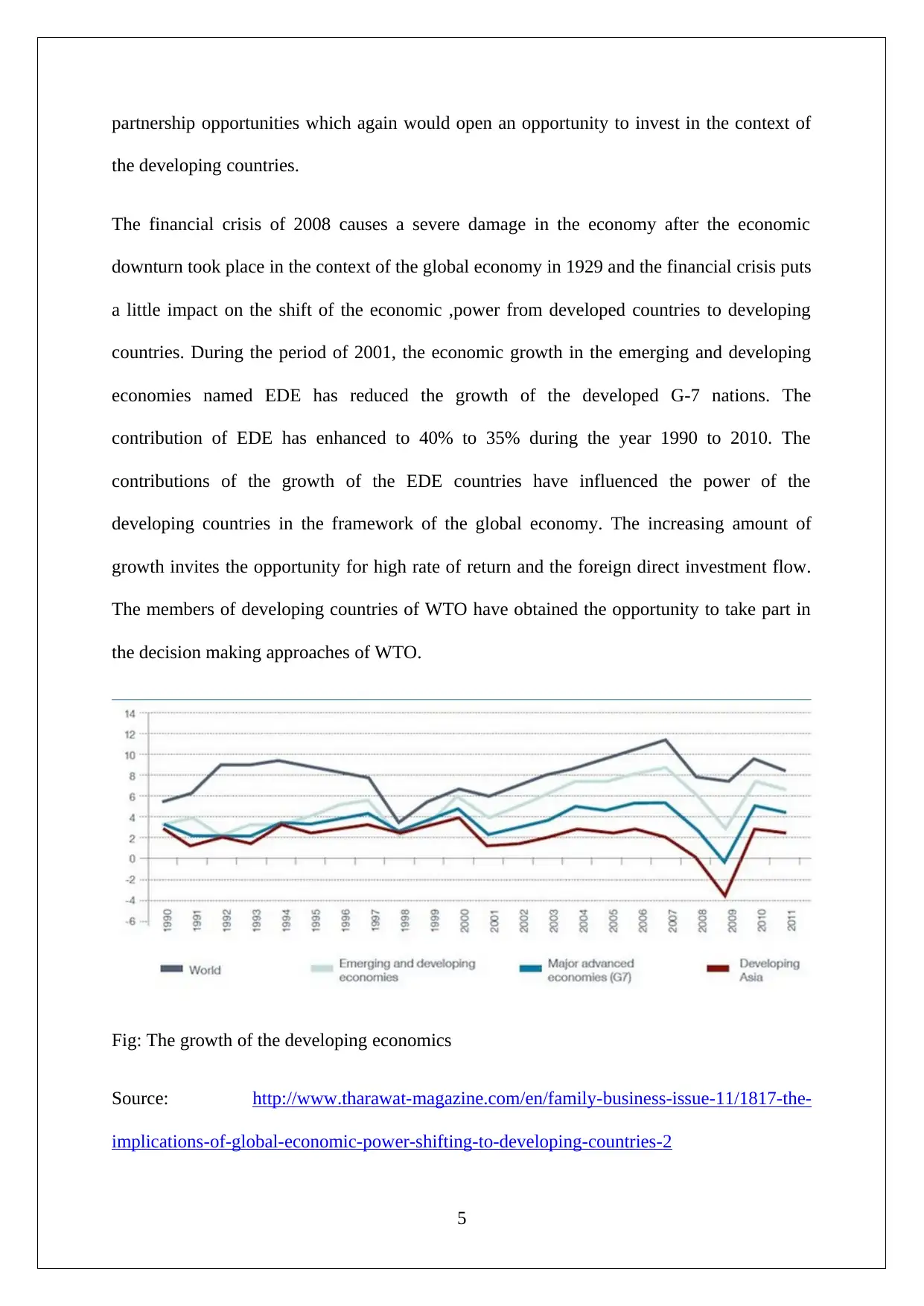
partnership opportunities which again would open an opportunity to invest in the context of
the developing countries.
The financial crisis of 2008 causes a severe damage in the economy after the economic
downturn took place in the context of the global economy in 1929 and the financial crisis puts
a little impact on the shift of the economic ,power from developed countries to developing
countries. During the period of 2001, the economic growth in the emerging and developing
economies named EDE has reduced the growth of the developed G-7 nations. The
contribution of EDE has enhanced to 40% to 35% during the year 1990 to 2010. The
contributions of the growth of the EDE countries have influenced the power of the
developing countries in the framework of the global economy. The increasing amount of
growth invites the opportunity for high rate of return and the foreign direct investment flow.
The members of developing countries of WTO have obtained the opportunity to take part in
the decision making approaches of WTO.
Fig: The growth of the developing economics
Source: http://www.tharawat-magazine.com/en/family-business-issue-11/1817-the-
implications-of-global-economic-power-shifting-to-developing-countries-2
5
the developing countries.
The financial crisis of 2008 causes a severe damage in the economy after the economic
downturn took place in the context of the global economy in 1929 and the financial crisis puts
a little impact on the shift of the economic ,power from developed countries to developing
countries. During the period of 2001, the economic growth in the emerging and developing
economies named EDE has reduced the growth of the developed G-7 nations. The
contribution of EDE has enhanced to 40% to 35% during the year 1990 to 2010. The
contributions of the growth of the EDE countries have influenced the power of the
developing countries in the framework of the global economy. The increasing amount of
growth invites the opportunity for high rate of return and the foreign direct investment flow.
The members of developing countries of WTO have obtained the opportunity to take part in
the decision making approaches of WTO.
Fig: The growth of the developing economics
Source: http://www.tharawat-magazine.com/en/family-business-issue-11/1817-the-
implications-of-global-economic-power-shifting-to-developing-countries-2
5
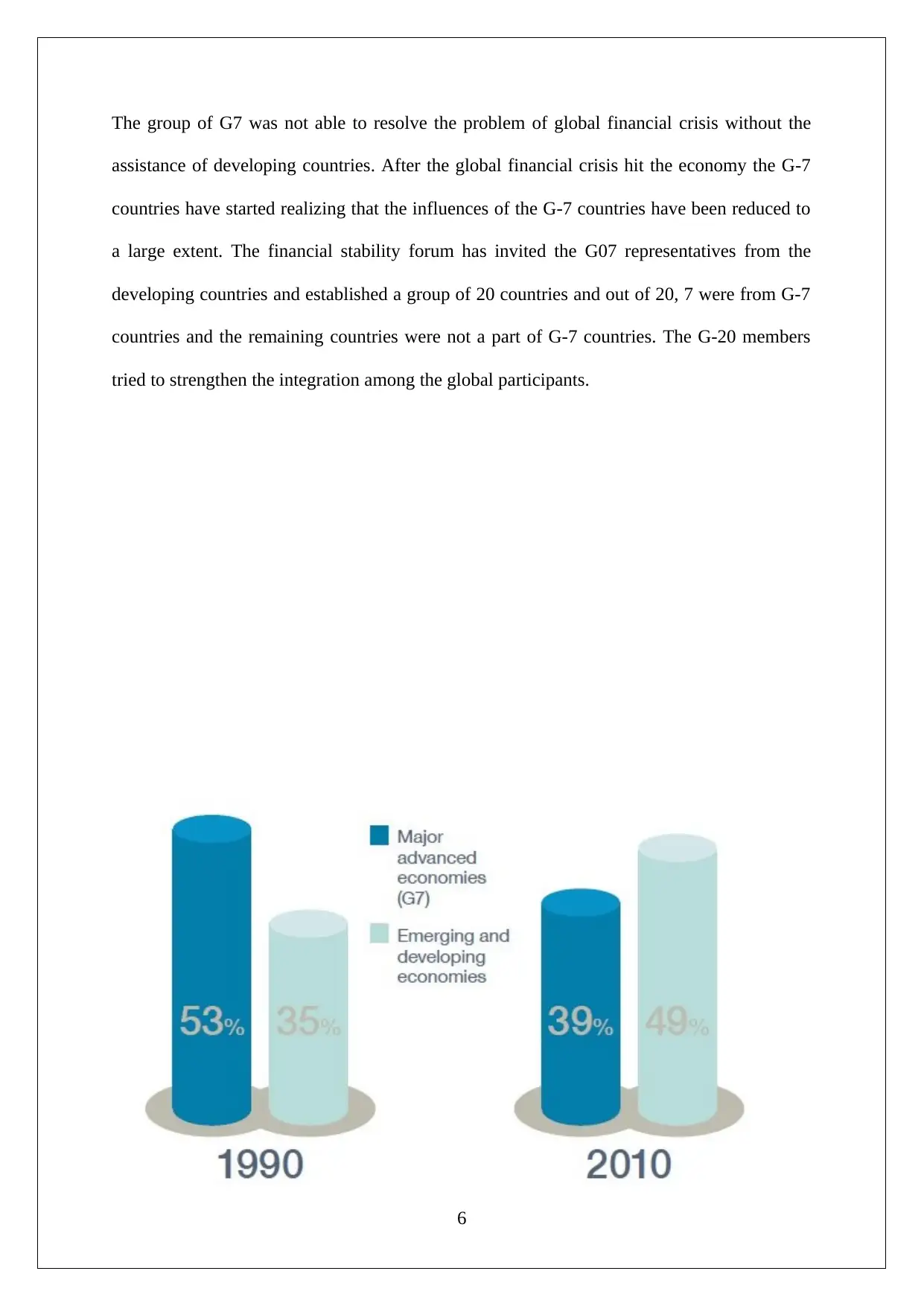
The group of G7 was not able to resolve the problem of global financial crisis without the
assistance of developing countries. After the global financial crisis hit the economy the G-7
countries have started realizing that the influences of the G-7 countries have been reduced to
a large extent. The financial stability forum has invited the G07 representatives from the
developing countries and established a group of 20 countries and out of 20, 7 were from G-7
countries and the remaining countries were not a part of G-7 countries. The G-20 members
tried to strengthen the integration among the global participants.
6
assistance of developing countries. After the global financial crisis hit the economy the G-7
countries have started realizing that the influences of the G-7 countries have been reduced to
a large extent. The financial stability forum has invited the G07 representatives from the
developing countries and established a group of 20 countries and out of 20, 7 were from G-7
countries and the remaining countries were not a part of G-7 countries. The G-20 members
tried to strengthen the integration among the global participants.
6
⊘ This is a preview!⊘
Do you want full access?
Subscribe today to unlock all pages.

Trusted by 1+ million students worldwide
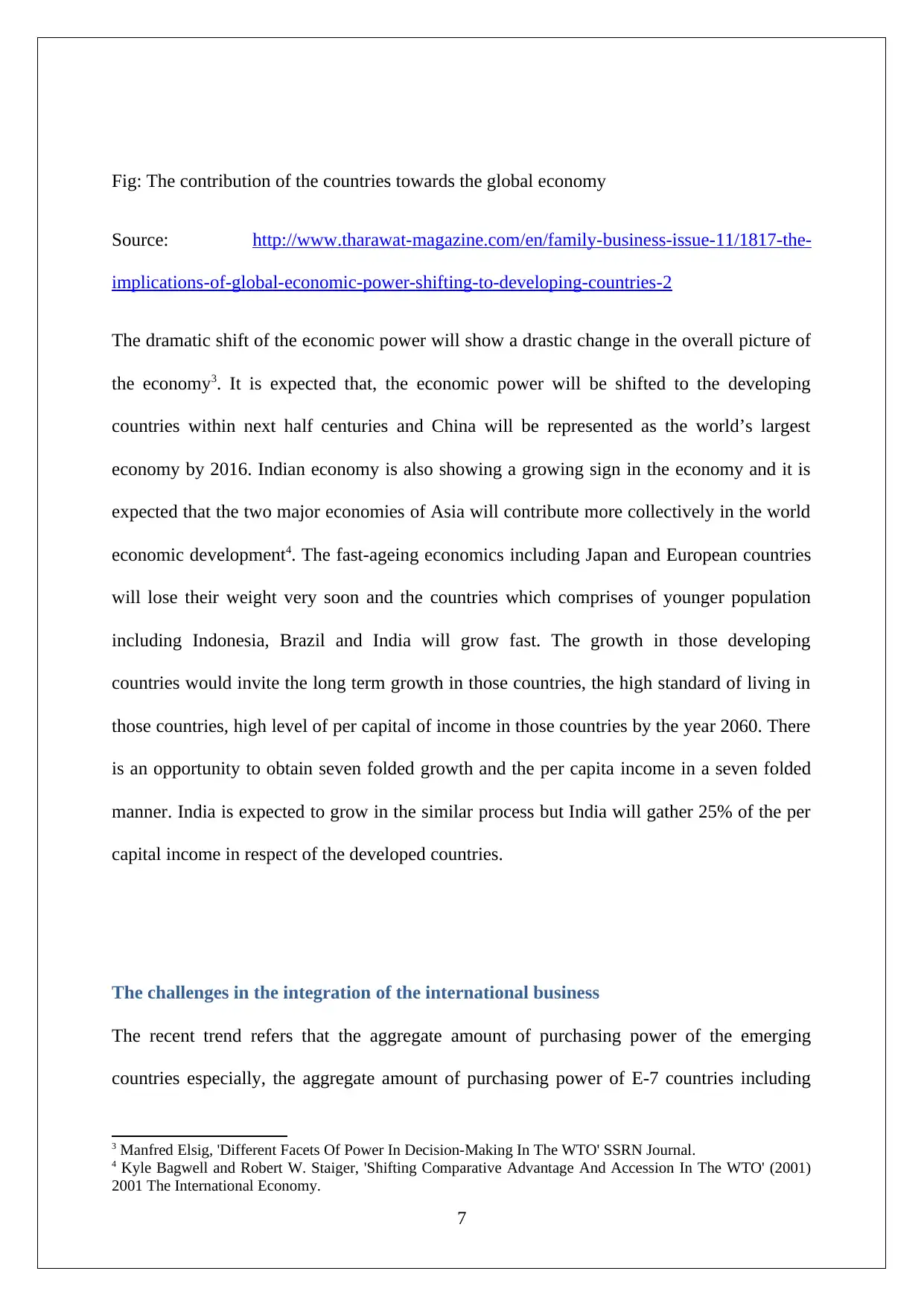
Fig: The contribution of the countries towards the global economy
Source: http://www.tharawat-magazine.com/en/family-business-issue-11/1817-the-
implications-of-global-economic-power-shifting-to-developing-countries-2
The dramatic shift of the economic power will show a drastic change in the overall picture of
the economy3. It is expected that, the economic power will be shifted to the developing
countries within next half centuries and China will be represented as the world’s largest
economy by 2016. Indian economy is also showing a growing sign in the economy and it is
expected that the two major economies of Asia will contribute more collectively in the world
economic development4. The fast-ageing economics including Japan and European countries
will lose their weight very soon and the countries which comprises of younger population
including Indonesia, Brazil and India will grow fast. The growth in those developing
countries would invite the long term growth in those countries, the high standard of living in
those countries, high level of per capital of income in those countries by the year 2060. There
is an opportunity to obtain seven folded growth and the per capita income in a seven folded
manner. India is expected to grow in the similar process but India will gather 25% of the per
capital income in respect of the developed countries.
The challenges in the integration of the international business
The recent trend refers that the aggregate amount of purchasing power of the emerging
countries especially, the aggregate amount of purchasing power of E-7 countries including
3 Manfred Elsig, 'Different Facets Of Power In Decision-Making In The WTO' SSRN Journal.
4 Kyle Bagwell and Robert W. Staiger, 'Shifting Comparative Advantage And Accession In The WTO' (2001)
2001 The International Economy.
7
Source: http://www.tharawat-magazine.com/en/family-business-issue-11/1817-the-
implications-of-global-economic-power-shifting-to-developing-countries-2
The dramatic shift of the economic power will show a drastic change in the overall picture of
the economy3. It is expected that, the economic power will be shifted to the developing
countries within next half centuries and China will be represented as the world’s largest
economy by 2016. Indian economy is also showing a growing sign in the economy and it is
expected that the two major economies of Asia will contribute more collectively in the world
economic development4. The fast-ageing economics including Japan and European countries
will lose their weight very soon and the countries which comprises of younger population
including Indonesia, Brazil and India will grow fast. The growth in those developing
countries would invite the long term growth in those countries, the high standard of living in
those countries, high level of per capital of income in those countries by the year 2060. There
is an opportunity to obtain seven folded growth and the per capita income in a seven folded
manner. India is expected to grow in the similar process but India will gather 25% of the per
capital income in respect of the developed countries.
The challenges in the integration of the international business
The recent trend refers that the aggregate amount of purchasing power of the emerging
countries especially, the aggregate amount of purchasing power of E-7 countries including
3 Manfred Elsig, 'Different Facets Of Power In Decision-Making In The WTO' SSRN Journal.
4 Kyle Bagwell and Robert W. Staiger, 'Shifting Comparative Advantage And Accession In The WTO' (2001)
2001 The International Economy.
7
Paraphrase This Document
Need a fresh take? Get an instant paraphrase of this document with our AI Paraphraser
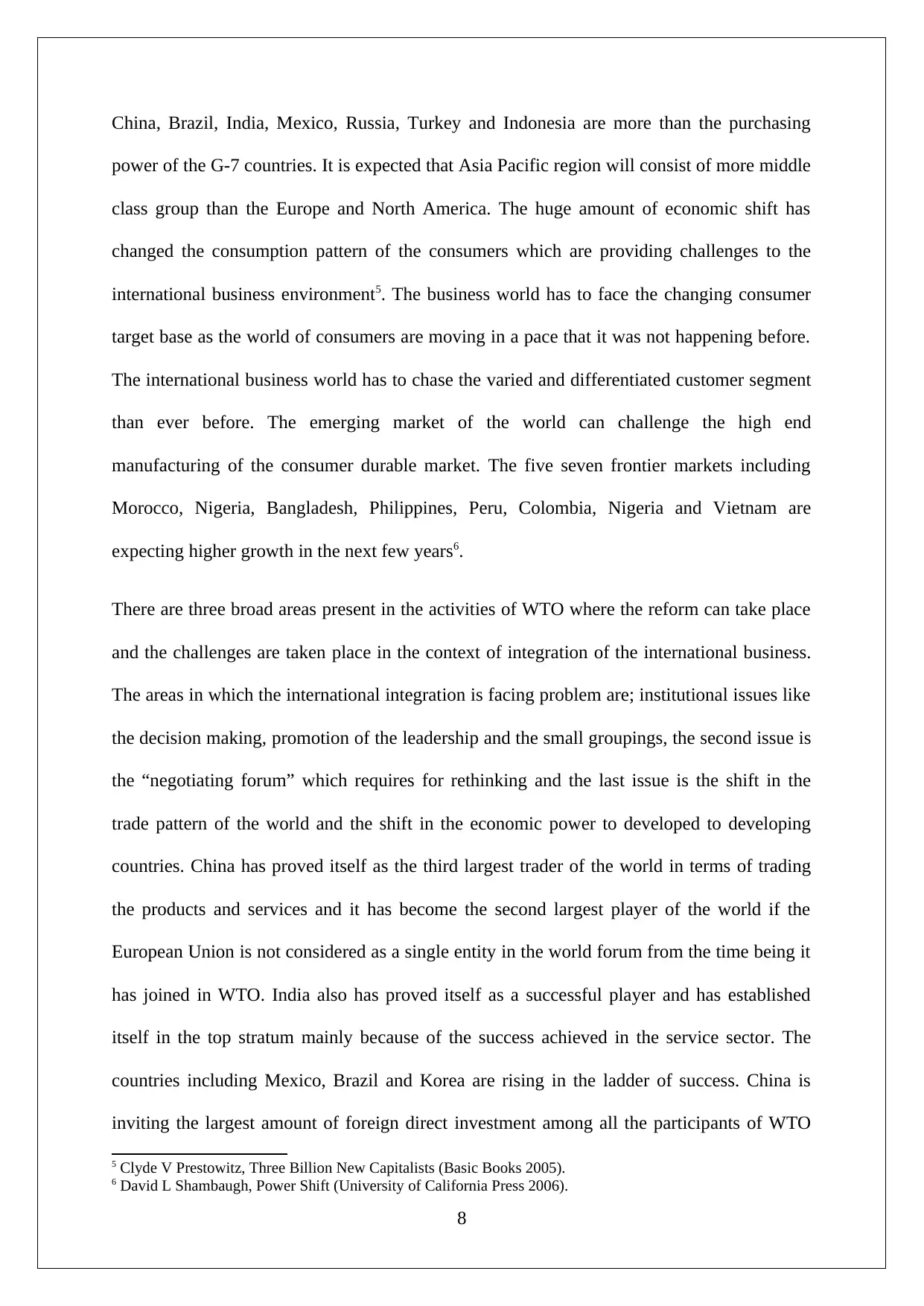
China, Brazil, India, Mexico, Russia, Turkey and Indonesia are more than the purchasing
power of the G-7 countries. It is expected that Asia Pacific region will consist of more middle
class group than the Europe and North America. The huge amount of economic shift has
changed the consumption pattern of the consumers which are providing challenges to the
international business environment5. The business world has to face the changing consumer
target base as the world of consumers are moving in a pace that it was not happening before.
The international business world has to chase the varied and differentiated customer segment
than ever before. The emerging market of the world can challenge the high end
manufacturing of the consumer durable market. The five seven frontier markets including
Morocco, Nigeria, Bangladesh, Philippines, Peru, Colombia, Nigeria and Vietnam are
expecting higher growth in the next few years6.
There are three broad areas present in the activities of WTO where the reform can take place
and the challenges are taken place in the context of integration of the international business.
The areas in which the international integration is facing problem are; institutional issues like
the decision making, promotion of the leadership and the small groupings, the second issue is
the “negotiating forum” which requires for rethinking and the last issue is the shift in the
trade pattern of the world and the shift in the economic power to developed to developing
countries. China has proved itself as the third largest trader of the world in terms of trading
the products and services and it has become the second largest player of the world if the
European Union is not considered as a single entity in the world forum from the time being it
has joined in WTO. India also has proved itself as a successful player and has established
itself in the top stratum mainly because of the success achieved in the service sector. The
countries including Mexico, Brazil and Korea are rising in the ladder of success. China is
inviting the largest amount of foreign direct investment among all the participants of WTO
5 Clyde V Prestowitz, Three Billion New Capitalists (Basic Books 2005).
6 David L Shambaugh, Power Shift (University of California Press 2006).
8
power of the G-7 countries. It is expected that Asia Pacific region will consist of more middle
class group than the Europe and North America. The huge amount of economic shift has
changed the consumption pattern of the consumers which are providing challenges to the
international business environment5. The business world has to face the changing consumer
target base as the world of consumers are moving in a pace that it was not happening before.
The international business world has to chase the varied and differentiated customer segment
than ever before. The emerging market of the world can challenge the high end
manufacturing of the consumer durable market. The five seven frontier markets including
Morocco, Nigeria, Bangladesh, Philippines, Peru, Colombia, Nigeria and Vietnam are
expecting higher growth in the next few years6.
There are three broad areas present in the activities of WTO where the reform can take place
and the challenges are taken place in the context of integration of the international business.
The areas in which the international integration is facing problem are; institutional issues like
the decision making, promotion of the leadership and the small groupings, the second issue is
the “negotiating forum” which requires for rethinking and the last issue is the shift in the
trade pattern of the world and the shift in the economic power to developed to developing
countries. China has proved itself as the third largest trader of the world in terms of trading
the products and services and it has become the second largest player of the world if the
European Union is not considered as a single entity in the world forum from the time being it
has joined in WTO. India also has proved itself as a successful player and has established
itself in the top stratum mainly because of the success achieved in the service sector. The
countries including Mexico, Brazil and Korea are rising in the ladder of success. China is
inviting the largest amount of foreign direct investment among all the participants of WTO
5 Clyde V Prestowitz, Three Billion New Capitalists (Basic Books 2005).
6 David L Shambaugh, Power Shift (University of California Press 2006).
8
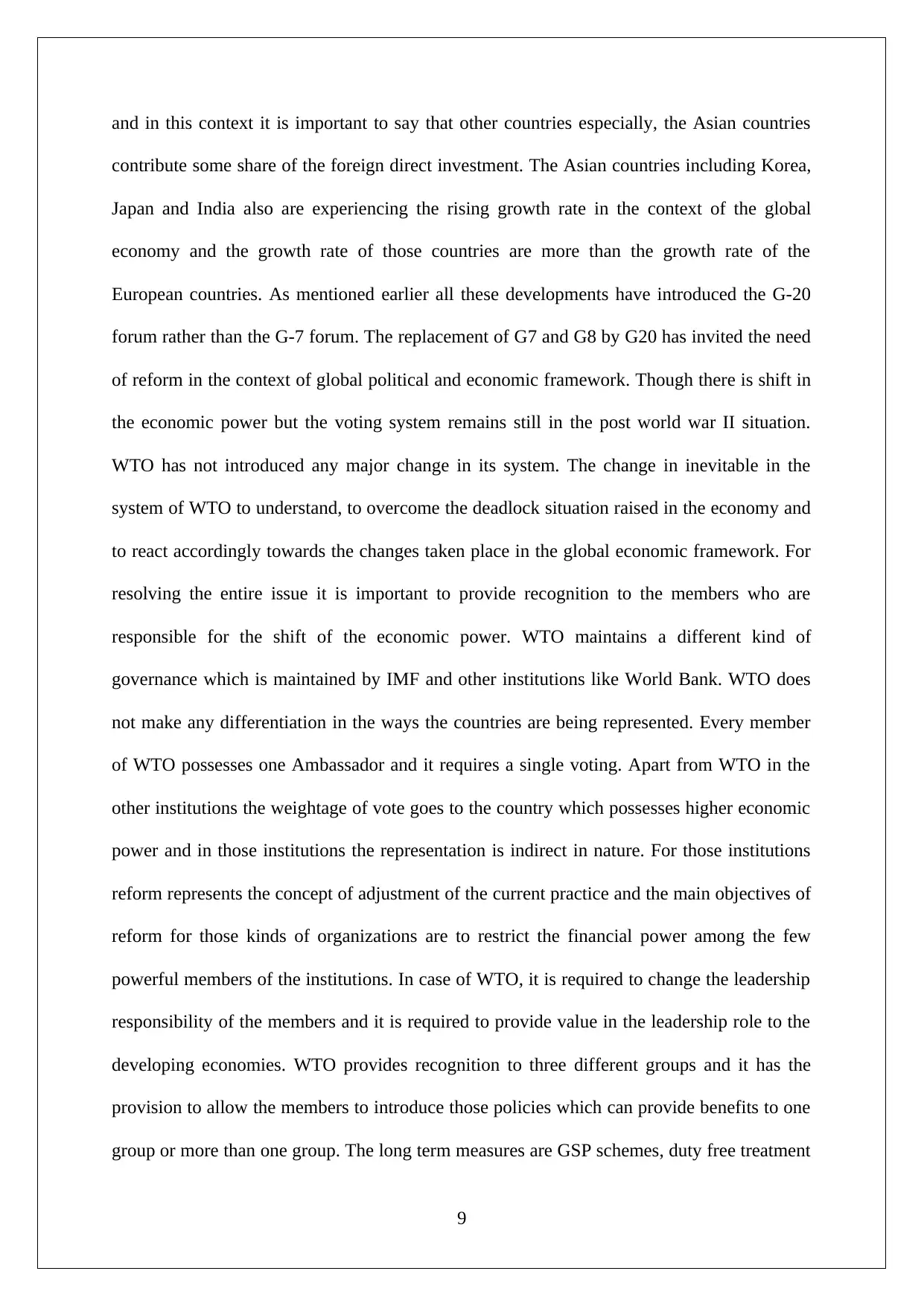
and in this context it is important to say that other countries especially, the Asian countries
contribute some share of the foreign direct investment. The Asian countries including Korea,
Japan and India also are experiencing the rising growth rate in the context of the global
economy and the growth rate of those countries are more than the growth rate of the
European countries. As mentioned earlier all these developments have introduced the G-20
forum rather than the G-7 forum. The replacement of G7 and G8 by G20 has invited the need
of reform in the context of global political and economic framework. Though there is shift in
the economic power but the voting system remains still in the post world war II situation.
WTO has not introduced any major change in its system. The change in inevitable in the
system of WTO to understand, to overcome the deadlock situation raised in the economy and
to react accordingly towards the changes taken place in the global economic framework. For
resolving the entire issue it is important to provide recognition to the members who are
responsible for the shift of the economic power. WTO maintains a different kind of
governance which is maintained by IMF and other institutions like World Bank. WTO does
not make any differentiation in the ways the countries are being represented. Every member
of WTO possesses one Ambassador and it requires a single voting. Apart from WTO in the
other institutions the weightage of vote goes to the country which possesses higher economic
power and in those institutions the representation is indirect in nature. For those institutions
reform represents the concept of adjustment of the current practice and the main objectives of
reform for those kinds of organizations are to restrict the financial power among the few
powerful members of the institutions. In case of WTO, it is required to change the leadership
responsibility of the members and it is required to provide value in the leadership role to the
developing economies. WTO provides recognition to three different groups and it has the
provision to allow the members to introduce those policies which can provide benefits to one
group or more than one group. The long term measures are GSP schemes, duty free treatment
9
contribute some share of the foreign direct investment. The Asian countries including Korea,
Japan and India also are experiencing the rising growth rate in the context of the global
economy and the growth rate of those countries are more than the growth rate of the
European countries. As mentioned earlier all these developments have introduced the G-20
forum rather than the G-7 forum. The replacement of G7 and G8 by G20 has invited the need
of reform in the context of global political and economic framework. Though there is shift in
the economic power but the voting system remains still in the post world war II situation.
WTO has not introduced any major change in its system. The change in inevitable in the
system of WTO to understand, to overcome the deadlock situation raised in the economy and
to react accordingly towards the changes taken place in the global economic framework. For
resolving the entire issue it is important to provide recognition to the members who are
responsible for the shift of the economic power. WTO maintains a different kind of
governance which is maintained by IMF and other institutions like World Bank. WTO does
not make any differentiation in the ways the countries are being represented. Every member
of WTO possesses one Ambassador and it requires a single voting. Apart from WTO in the
other institutions the weightage of vote goes to the country which possesses higher economic
power and in those institutions the representation is indirect in nature. For those institutions
reform represents the concept of adjustment of the current practice and the main objectives of
reform for those kinds of organizations are to restrict the financial power among the few
powerful members of the institutions. In case of WTO, it is required to change the leadership
responsibility of the members and it is required to provide value in the leadership role to the
developing economies. WTO provides recognition to three different groups and it has the
provision to allow the members to introduce those policies which can provide benefits to one
group or more than one group. The long term measures are GSP schemes, duty free treatment
9
⊘ This is a preview!⊘
Do you want full access?
Subscribe today to unlock all pages.

Trusted by 1+ million students worldwide
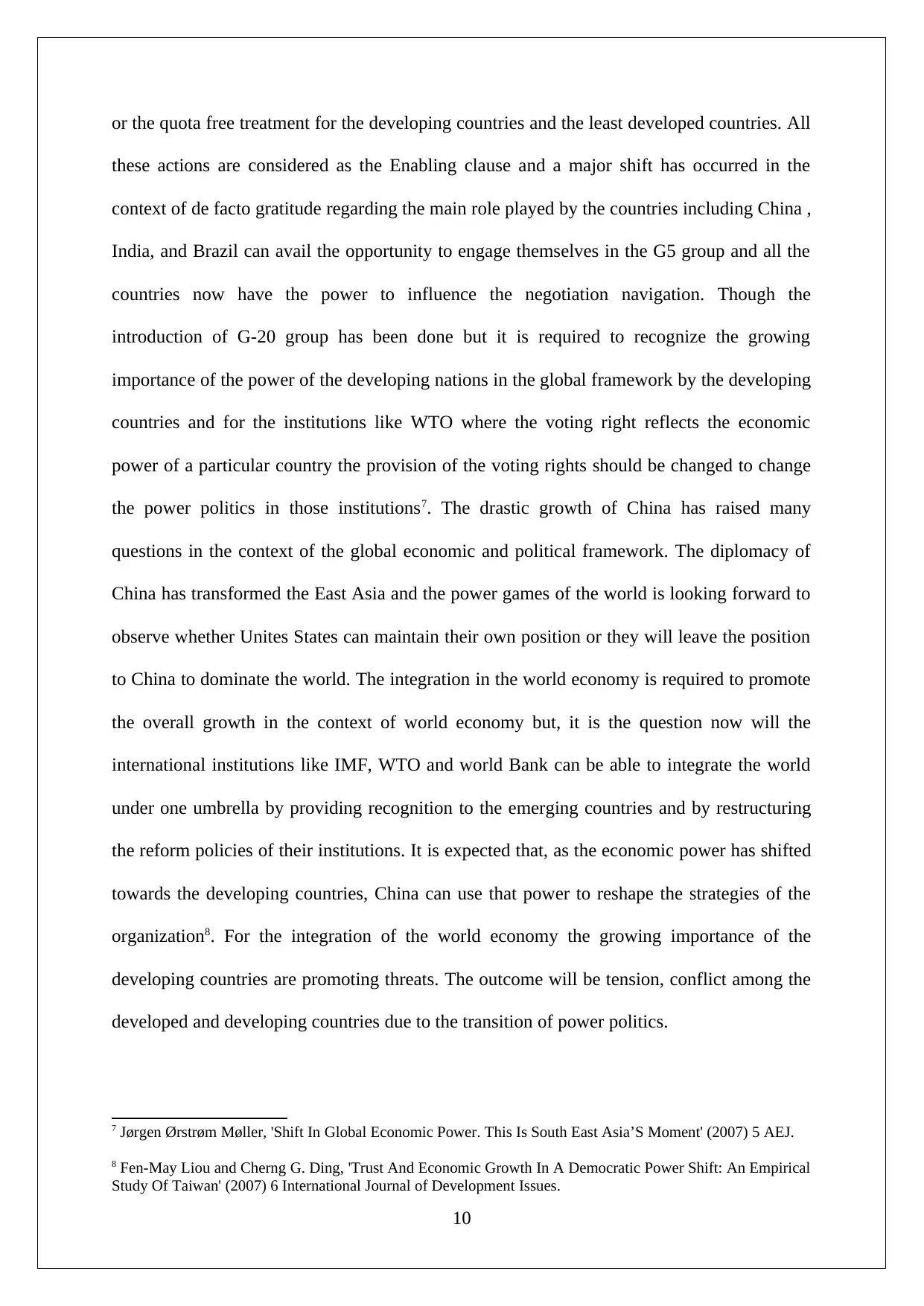
or the quota free treatment for the developing countries and the least developed countries. All
these actions are considered as the Enabling clause and a major shift has occurred in the
context of de facto gratitude regarding the main role played by the countries including China ,
India, and Brazil can avail the opportunity to engage themselves in the G5 group and all the
countries now have the power to influence the negotiation navigation. Though the
introduction of G-20 group has been done but it is required to recognize the growing
importance of the power of the developing nations in the global framework by the developing
countries and for the institutions like WTO where the voting right reflects the economic
power of a particular country the provision of the voting rights should be changed to change
the power politics in those institutions7. The drastic growth of China has raised many
questions in the context of the global economic and political framework. The diplomacy of
China has transformed the East Asia and the power games of the world is looking forward to
observe whether Unites States can maintain their own position or they will leave the position
to China to dominate the world. The integration in the world economy is required to promote
the overall growth in the context of world economy but, it is the question now will the
international institutions like IMF, WTO and world Bank can be able to integrate the world
under one umbrella by providing recognition to the emerging countries and by restructuring
the reform policies of their institutions. It is expected that, as the economic power has shifted
towards the developing countries, China can use that power to reshape the strategies of the
organization8. For the integration of the world economy the growing importance of the
developing countries are promoting threats. The outcome will be tension, conflict among the
developed and developing countries due to the transition of power politics.
7 Jørgen Ørstrøm Møller, 'Shift In Global Economic Power. This Is South East Asia’S Moment' (2007) 5 AEJ.
8 Fen-May Liou and Cherng G. Ding, 'Trust And Economic Growth In A Democratic Power Shift: An Empirical
Study Of Taiwan' (2007) 6 International Journal of Development Issues.
10
these actions are considered as the Enabling clause and a major shift has occurred in the
context of de facto gratitude regarding the main role played by the countries including China ,
India, and Brazil can avail the opportunity to engage themselves in the G5 group and all the
countries now have the power to influence the negotiation navigation. Though the
introduction of G-20 group has been done but it is required to recognize the growing
importance of the power of the developing nations in the global framework by the developing
countries and for the institutions like WTO where the voting right reflects the economic
power of a particular country the provision of the voting rights should be changed to change
the power politics in those institutions7. The drastic growth of China has raised many
questions in the context of the global economic and political framework. The diplomacy of
China has transformed the East Asia and the power games of the world is looking forward to
observe whether Unites States can maintain their own position or they will leave the position
to China to dominate the world. The integration in the world economy is required to promote
the overall growth in the context of world economy but, it is the question now will the
international institutions like IMF, WTO and world Bank can be able to integrate the world
under one umbrella by providing recognition to the emerging countries and by restructuring
the reform policies of their institutions. It is expected that, as the economic power has shifted
towards the developing countries, China can use that power to reshape the strategies of the
organization8. For the integration of the world economy the growing importance of the
developing countries are promoting threats. The outcome will be tension, conflict among the
developed and developing countries due to the transition of power politics.
7 Jørgen Ørstrøm Møller, 'Shift In Global Economic Power. This Is South East Asia’S Moment' (2007) 5 AEJ.
8 Fen-May Liou and Cherng G. Ding, 'Trust And Economic Growth In A Democratic Power Shift: An Empirical
Study Of Taiwan' (2007) 6 International Journal of Development Issues.
10
Paraphrase This Document
Need a fresh take? Get an instant paraphrase of this document with our AI Paraphraser
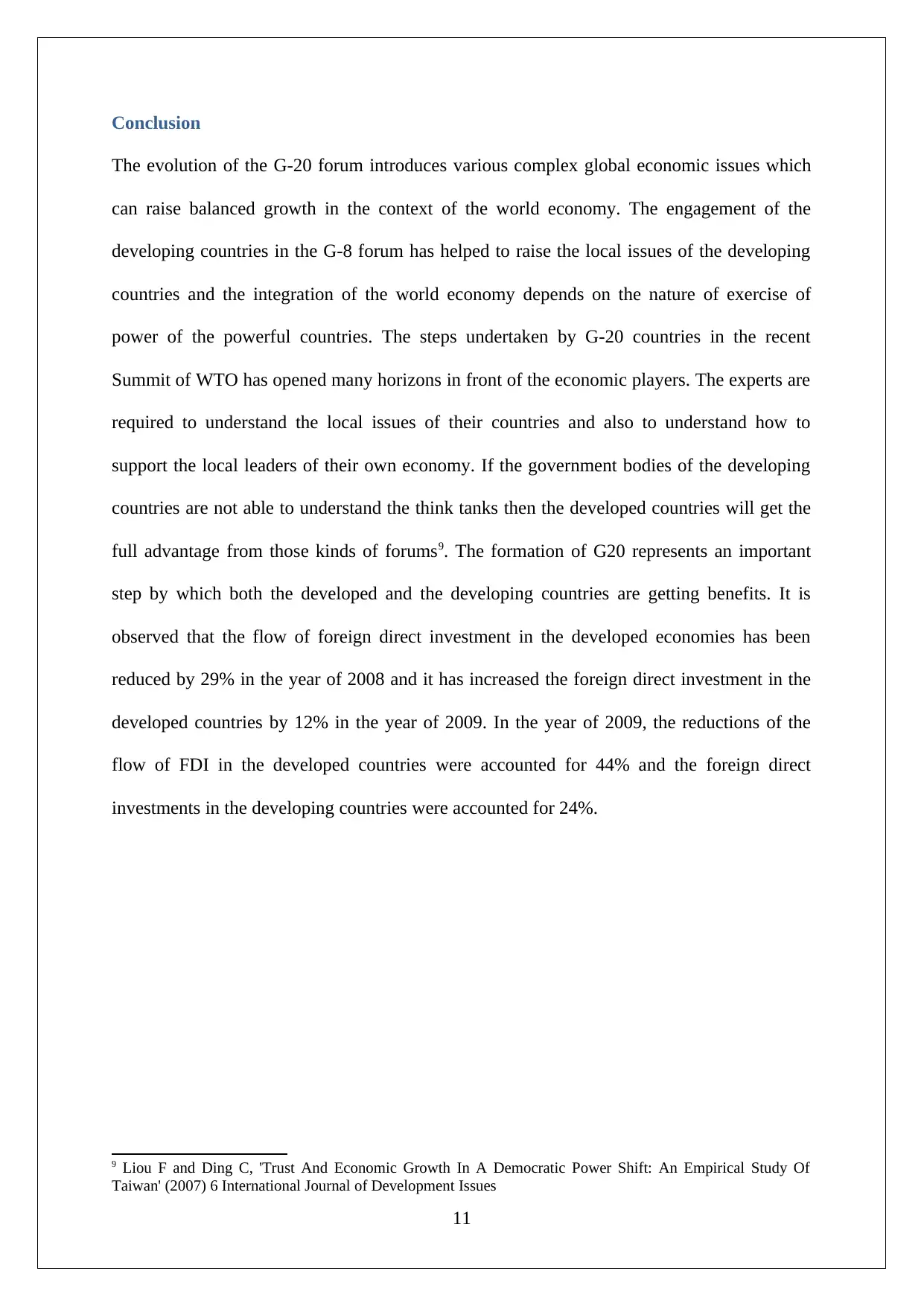
Conclusion
The evolution of the G-20 forum introduces various complex global economic issues which
can raise balanced growth in the context of the world economy. The engagement of the
developing countries in the G-8 forum has helped to raise the local issues of the developing
countries and the integration of the world economy depends on the nature of exercise of
power of the powerful countries. The steps undertaken by G-20 countries in the recent
Summit of WTO has opened many horizons in front of the economic players. The experts are
required to understand the local issues of their countries and also to understand how to
support the local leaders of their own economy. If the government bodies of the developing
countries are not able to understand the think tanks then the developed countries will get the
full advantage from those kinds of forums9. The formation of G20 represents an important
step by which both the developed and the developing countries are getting benefits. It is
observed that the flow of foreign direct investment in the developed economies has been
reduced by 29% in the year of 2008 and it has increased the foreign direct investment in the
developed countries by 12% in the year of 2009. In the year of 2009, the reductions of the
flow of FDI in the developed countries were accounted for 44% and the foreign direct
investments in the developing countries were accounted for 24%.
9 Liou F and Ding C, 'Trust And Economic Growth In A Democratic Power Shift: An Empirical Study Of
Taiwan' (2007) 6 International Journal of Development Issues
11
The evolution of the G-20 forum introduces various complex global economic issues which
can raise balanced growth in the context of the world economy. The engagement of the
developing countries in the G-8 forum has helped to raise the local issues of the developing
countries and the integration of the world economy depends on the nature of exercise of
power of the powerful countries. The steps undertaken by G-20 countries in the recent
Summit of WTO has opened many horizons in front of the economic players. The experts are
required to understand the local issues of their countries and also to understand how to
support the local leaders of their own economy. If the government bodies of the developing
countries are not able to understand the think tanks then the developed countries will get the
full advantage from those kinds of forums9. The formation of G20 represents an important
step by which both the developed and the developing countries are getting benefits. It is
observed that the flow of foreign direct investment in the developed economies has been
reduced by 29% in the year of 2008 and it has increased the foreign direct investment in the
developed countries by 12% in the year of 2009. In the year of 2009, the reductions of the
flow of FDI in the developed countries were accounted for 44% and the foreign direct
investments in the developing countries were accounted for 24%.
9 Liou F and Ding C, 'Trust And Economic Growth In A Democratic Power Shift: An Empirical Study Of
Taiwan' (2007) 6 International Journal of Development Issues
11
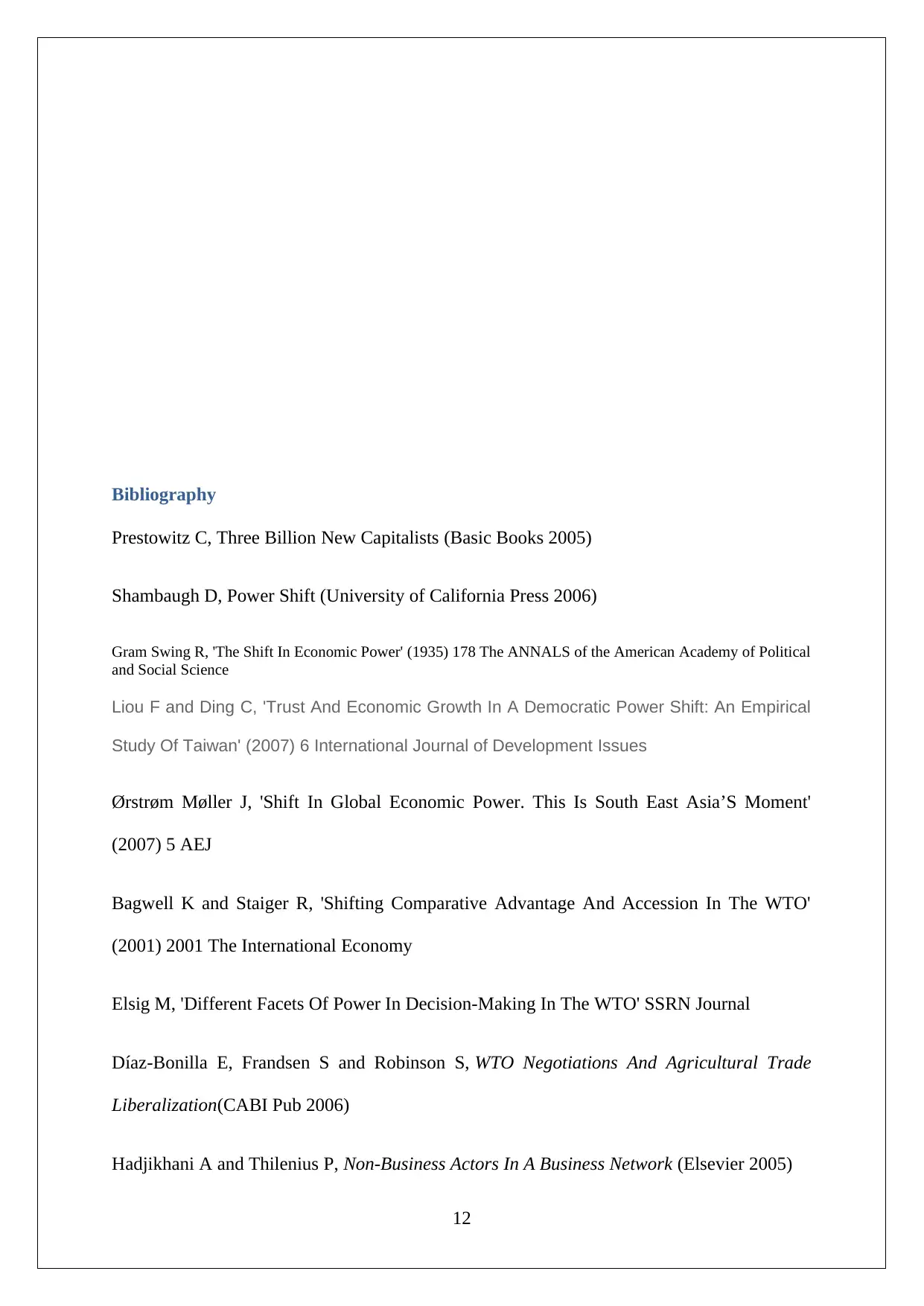
Bibliography
Prestowitz C, Three Billion New Capitalists (Basic Books 2005)
Shambaugh D, Power Shift (University of California Press 2006)
Gram Swing R, 'The Shift In Economic Power' (1935) 178 The ANNALS of the American Academy of Political
and Social Science
Liou F and Ding C, 'Trust And Economic Growth In A Democratic Power Shift: An Empirical
Study Of Taiwan' (2007) 6 International Journal of Development Issues
Ørstrøm Møller J, 'Shift In Global Economic Power. This Is South East Asia’S Moment'
(2007) 5 AEJ
Bagwell K and Staiger R, 'Shifting Comparative Advantage And Accession In The WTO'
(2001) 2001 The International Economy
Elsig M, 'Different Facets Of Power In Decision-Making In The WTO' SSRN Journal
Díaz-Bonilla E, Frandsen S and Robinson S, WTO Negotiations And Agricultural Trade
Liberalization(CABI Pub 2006)
Hadjikhani A and Thilenius P, Non-Business Actors In A Business Network (Elsevier 2005)
12
Prestowitz C, Three Billion New Capitalists (Basic Books 2005)
Shambaugh D, Power Shift (University of California Press 2006)
Gram Swing R, 'The Shift In Economic Power' (1935) 178 The ANNALS of the American Academy of Political
and Social Science
Liou F and Ding C, 'Trust And Economic Growth In A Democratic Power Shift: An Empirical
Study Of Taiwan' (2007) 6 International Journal of Development Issues
Ørstrøm Møller J, 'Shift In Global Economic Power. This Is South East Asia’S Moment'
(2007) 5 AEJ
Bagwell K and Staiger R, 'Shifting Comparative Advantage And Accession In The WTO'
(2001) 2001 The International Economy
Elsig M, 'Different Facets Of Power In Decision-Making In The WTO' SSRN Journal
Díaz-Bonilla E, Frandsen S and Robinson S, WTO Negotiations And Agricultural Trade
Liberalization(CABI Pub 2006)
Hadjikhani A and Thilenius P, Non-Business Actors In A Business Network (Elsevier 2005)
12
⊘ This is a preview!⊘
Do you want full access?
Subscribe today to unlock all pages.

Trusted by 1+ million students worldwide
1 out of 12
Related Documents
Your All-in-One AI-Powered Toolkit for Academic Success.
+13062052269
info@desklib.com
Available 24*7 on WhatsApp / Email
![[object Object]](/_next/static/media/star-bottom.7253800d.svg)
Unlock your academic potential
Copyright © 2020–2025 A2Z Services. All Rights Reserved. Developed and managed by ZUCOL.





